English CBSE Class 12 NCERT Vistas Chapter 8 Memories Of Childhood Free Solution of Extra Questions and Answers – Extract Based Questions Short Answer Questions Long Answer Questions and Value Based Questions.
MEMORIES OF CHILDHOOD
(Extra Questions)
Multiple Choice Questions
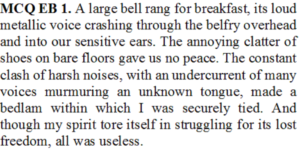

(i) Which of the following sound has not been mentioned in the extract?
(a) metallic sound
(b) clatter of shoes
(c) spoken language
(d) beats of heart
(ii) Based on the extract, please select the correct option –
Statement 1 – The author was not used to loud sounds or voices
Statement 2 – The author did not like to be at the present place
(a) Statement 1 alone can be inferred from the extract
(b) Statement 2 alone can be inferred from the extract
(c) Neither Statement 1 nor Statement 2 can be inferred from the extract
(d) Both Statement 1 and Statement 2 can be inferred from the extract
(iii) ‘many voices murmuring an unknown tongue’. In this part of the sentence what does ‘unknown tongue’ imply?
(a) unseen tongue
(b) unfamiliar language
(c) illegible writing
(d) inaudible voice
(iv) ‘And though my spirit tore itself in struggling for its lost freedom, all was useless.’ Which of the following would most closely describe emotions of author as represented in this sentence?
(a) austere
(b) resignation
(c) revolt
(d) aggression
(v) Which of the following word as used in the extract is synonym of ‘chaos’?
(a) crashing
(b) undercurrent
(c) clatter
(d) bedlam
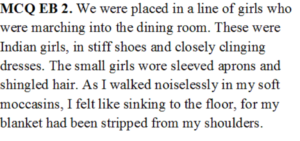

(i) Which of the following can be inferred from the extract?
Statement 1: There was a protocol for getting into the dining room.
Statement 2: The author wanted to revolt against the protocol.
(a) Statement 1 is true and Statement 2 cannot be inferred
(b) Statement 2 is true and Statement 1 cannot be inferred
(c) Statement 1 and Statement 2 both cannot be inferred
(d) Both statements can be inferred.
(ii) Why was author able to walk noiselessly?
(a) She had a blanket
(b) She had several thoughts
(c) She had sharp eyes
(d) She had different shoes
(iii) ‘I felt like sinking to the floor’? What are the feelings of author in this sentence?
(a) pride
(b) sorrow
(c) embarrassment
(d) indignation
(iv) Which of the following are not correct about the other girls mentioned in the extract?
1. They walked in a file
2. They wore stiff shoes
3. They were dressed modestly
4. Some wore sleeved aprons
5. Some wore moccasins
(a) 1 and 4
(b) 3 and 5
(c) 2 and 4
(d) 1 and 5
(v) Which of the following word as used in the extract is synonym of ‘removed’?
(a) placed
(b) wore
(c) stripped
(d) shingled
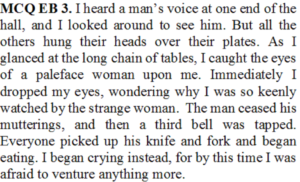

(i) When did everyone start eating?
(a) After the man stopped speaking
(b) After the paleface woman gave permission
(c) After the author started crying
(d) After the third bell was tapped
(ii) In which of the following sentence the underlined words cannot be replaced by ‘keenly’?
(a) Suresh was very eagerly watching the final match of the tournament.
(b) David is fully aware that this is his last chance to succeed.
(c) Your arrival at home is long
(d) Prakash is deeply rooted to his native culture.
(iii) The author dropped her eyes off the paleface woman because –
(a) The author got afraid
(b) The author got puzzled
(c) The author wanted to neglect the woman
(d) The wanted to concentrate on eating
(iv) Which of the following would be the most appropriate reason that author started crying?
(a) The quality of food was not good.
(b) She was not used to such elaborate routine
(c) The paleface woman was frightening
(d) Suddenly there was a deep silence in the dining room
(v) What according to you the man was reciting?
(a) prayer
(b) a movie song
(c) nutrient value of food
(d) rules of dining
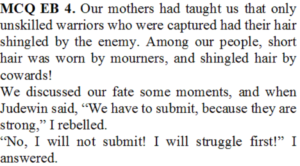

(i) Who, according to the extract, did not keep short hair?
(a) captured warriors
(b) mourners
(c) braves
(d) cowards
(ii) Based on the following statements please choose the correct option.
Statement 1: The author seems to have respect for opinion of her mother.
Statement 2: The author had her native culture deeply rooted to her.
(a) Statement 1 alone can be inferred
(b) Statement 2 is alone can be inferred
(c) Statement 1 and Statement 2 both cannot be inferred
(d) Both statements can be inferred.
(iii) Which of the following emotions the author most likely did not have when she decided to rebel?
1. hate
2. strength
3. pleasure
4. protest
5. obedience
6. disrespect
(a) 1 and 5
(b) 2 and 3
(c) 3 and 6
(d) 3 and 5
(iv) Which of the following word as used in the extract carries the same meaning as ‘accept’?
(a) submit
(b) fate
(c) mourners
(d) strong
(v) The extract does not discuss about –
(a) Impact a mother creates on her children
(b) Deep rooted cultural traditions
(c) Need to confide among friends
(d) Futility of unprovoked anger
(vi) ‘Among our people, short hair was worn by mourners, and shingled hair by cowards!’ This sentence conveys
(a) an assessment
(b) a belief
(c) an imagination
(d) a contradiction
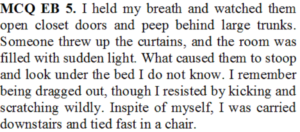

(i) Which of the following statement represents the end result expressed in the extract?
(a) The author was quickly tied in a chair
(b) The author was securely tied in a chair
(c) The author was loosely tied in a chair
(d) The author was imaginatively tied in a chair
(ii) Which of the following location was not searched to find the author?
1. In the closet
2. Above the trunks
3. Behind the curtains
4. In the bed
5. Under the bed
(a) 1 and 4
(b) 2 and 4
(c) 3 and 4
(d) 4 and 5
(iii) Where was author carried to?
(a) below the stairs
(b) on the lower floor
(c) on the upper floor
(d) at the same floor
(iv) Which of the following activity was not done by the author after she was found?
(a) dragging
(b) kicking
(c) scratching
(d) None of the above


(i) Which of the following closely describes the reason the author called himself an animal?
(a) She was forced to walk like an animal
(b) Her opinion was not asked.
(c) Her emotions were not considered
(d) Her mother was not with her
(ii) Based on the following statements please choose the correct option.
Statement 1: Author’s mother talked to her softly.
Statement 2: Author felt that nobody else was logical
(a) Statement 1 alone can be inferred
(b) Statement 2 is alone can be inferred
(c) Statement 1 and Statement 2 both cannot be inferred
(d) Both statements can be inferred.
(iii) According to the extract which of the following is not correct?
1. The author felt she would appear a coward
2. The author suffered a deep mental agony
3. Author’s mother had forewarned her about the incident
4. The author eventually realised that she was lonely and helpless
5. Most appreciated the emotions of author
(a) 3 and 5
(b) 2 and 3
(c) 3 and 4
(d)1 and 4
(iv) Based on the extract, which of the following would have been the wish of the author while her hair were being shingled?
(a) I wish my hair never grew long
(b) I wish my mother were here with me
(c) I wish I had the authority to punish these people
(d) I wish I could become an animal
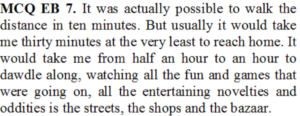

(i) What was the minimum time author used to take to reach home?
(a) 10 minutes
(b) 30 minutes
(c) 60 minutes
(d) None of the above
(ii) Based on the following statements please choose the correct option.
Statement 1: The author was quite playful.
Statement 2: She took more time to reach home
(a) Statement 1 is the cause and Statement 2 is effect
(b) Both statements represent desirable effects
(c) Both statements represent valid causes
(d) Statement 2 is the cause and Statement 1 is effect
(iii) Which of the following word as used in the extract mean ‘often’?
(a) actually
(b) dawdle
(c) usually
(d) least
(iv) Which of the following were not the attractions on the way to home?
1. Games
2. Novelties
3. Uniformity
4. Peculiarities
5. Shops
6. Swings
(a) 1 and 3
(b) 3 and 6
(c) 2 and 5
(d) 1 and 4
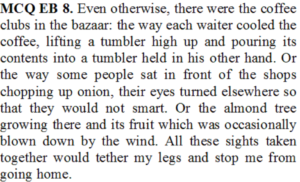

(i) Which of the following would be the most appropriate title of the extract?
(a) Amusing activities
(b) What delayed me
(c) Attraction in abundance
(d) Diversion ahead
(ii) Based on the following statements please choose the correct option.
Statement 1: Author was amazed by the scenes on her way to home
Statement 2: She would usually reach home late.
(a) Statement 1 is true and Statement 2 is false
(b) Both statements represent desirable aspects
(c) Both statements are false
(d) Both statements can be inferred.
(iii) According to the extract which of the following are not implied?
1. The bazar had many shops
2. Coffee was a popular beverage
3. One should look at onion while chopping it
4. The author liked almond
5. Somebody had tied legs of author
(a) 1 and 5
(b) 2 and 3
(c) 3 and 4
(d) 3 and 5
(iv) In which of the following sentence, the word ‘pouring’ has been used incorrectly?
(a) Pouring oil in a fire is no way to quench it.
(b) I was pouring lemonade into four big glasses
(c) Tributes have been pouring in since Harish invented a new design
(d) Pouring restrictions is a definite way to annoy a teenager.
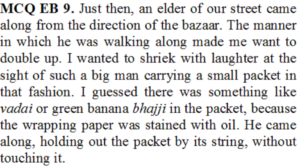

(i) Which of the following was touched by the elder?
(a) vadai
(b) bhajji
(c) wrapping paper
(d) string
(ii) Based on the following statements please choose the correct option.
Statement 1: The wrapping paper had stains of oil
Statement 2: The author guessed that the packet had either vadai or bhajji
(a) Statement 1 is true and Statement 2 is false
(b) Statement 2 is the cause of the effect created by Statement 1
(c) Both statements are independent of each other
(d) Statement 1 is the cause of the effect created by Statement 2
(iii) Which of the following attributes can be inferred for the author?
1. observant
2. playful
3. ignorant
4. logical
5. arrogant
(a) 1, 3 and 5
(b) 1, 2 and 4
(c) 2, 3 and 4
(d) 2, 3 and 5
(iv) ‘The manner in which he was walking along ….’. In which of the following sentence the word ‘manner’ has not been used to imply the similar meaning as that in this sentence?
(a) Today the president spoke in a different manner.
(b) His manner is a major factor in his success.
(c) Manner of presentation in a meeting is very important
(d) It is incorrect to treat prisoners in an unethical manner.
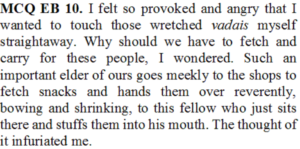

(i) In which of the following situations a person can become ‘provoked’?
(a) Students submitted a request to the principal for extra class
(b) The General Manager organized a meeting of salespersons
(c) The police thrashed an innocent child
(d) The army organized a marathon for residents of our locality.
(ii) ‘The thought of it infuriated me.’ Which of the following most closely represents the word ‘it’ as used in this sentence.
(a) The prevailing inferiority of our people
(b) The prevailing superiority of others
(c) Neither (a) nor (b)
(d) Both (a) and (b)
(iii) The elderly gave snacks reverently, bowing and shrinking. It implies that the elderly was –
1. meek
2. submissive
3. aggressive
4. servile
5. autocratic
(a) 1, 2 and 5
(b) 2, 3 and 4
(c) 1, 2 and 4
(d) 1, 3 and 5
(iv)The author was subjected to which of the following emotions –
(a) anger
(b) hate
(c) pity
(d) All the above
(v)Which of the following word as used in the extract mean ‘immediately’-
(a) meekly
(b) straightaway
(c) reverently
(d) shrinking
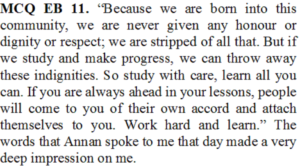

(i) In which of the following sentence the phrase ‘stripped of’ has not been used similar to ‘we are stripped of all that’?
(a) David was stripped of the gold medal due to use of drug.
(b) The court stripped me of all my ancestral property.
(c) The Brigadier was stripped of his rank
(d) The kid stripped the paper of the wall
(ii) Which of the following represents the advice of Annan?
(a) Education is the key to unlock the golden door of freedom.
(b) Education is for improving life of others.
(c) Never stop learning because life never stops teaching.
(d) If you think education is expensive try ignorance.
(iii)Which social evil has been hinted in the extract?
(a) dowry
(b) child marriage
(c) illiteracy
(d) casteism
(iv)Which of the following word as used in the extract to mean ‘disrespects’-
(a) honour
(b) indignities
(c) lesson
(d) accord
Extract Based Questions


1. From which lesson the above extract has been taken?
2. Who is referred as ‘I’ in above extract?
3. Where was the narrator?
4. Which word in abstract mean ‘confusion’?


1. To whom does the word ‘I’ refer to in above extract?
2. ‘I pulled out mine’. What was pulled out?
3. What does the group of word ‘this act’ refer to in above extract?
4. Which word in the extract mean of ‘remaining’?


1. Who is speaker of the above extract?
2. How many times small bell was tapped before start of eating?
3. What was the warning?
4. Which word in the extract is antonym of ‘pleasant’?


1. According to extract, who wore short hair?
2. What did enemy do to captured warriors?
3. Name two girls who were friend of each other?
D4. Which word in the extract is antonym of ‘released’?


1. From where was the author coming?
2. Where was the author going?
3. What was the usual time of travel, if she had not stopped on the way?
4. Which word in the extract mean ‘strange things or acts’?


1. As per the guess of author, what was in the packet?
2. How could author guess about contents of the packet?
3. For whom the contents were being taken?
4. Which word in the extract mean ‘manner’?


1. Who is referred as ‘he’ in above extract?
2. Who is referred as ‘they’ in above extract?
3. Which social evil is being described in the above extract?
4. Which word in the extract mean ‘trusted’?


1. Who is referred as ‘this fellow’ in above extract?
2. What snack was brought?
3. Why was ‘this fellow’ sitting there?
4. Which word in the extract mean ‘with lot of respect’?


1. Who is referred to as ‘he’ in above extract?
2. From where was ‘he’ coming?
3. What did the man ask him?
4. Which word in the extract is antonym of ‘ahead’?


1. Who is referred as ‘you’ in above extract?
2. Who is speaker of above extract?
3. What is meaning of ‘always ahead in your lessons’?
4. Which word in the extract mean ‘wish’?
Short Answer Questions – 30 to 40 words


Answer: Frist bell was tapped, pupils pulled out chairs and remained standing. Zitkala also pulled out hers and sat on it but immediately started getting up. Second bell rang and all students sat, she also sat. A man’s voice was heard, all pupils bent their heads over their plates. After third bell they picked up forks and began eating.


Answer: Certain rules for arriving at and sitting at the dining table were to be followed. These were indicated by ringing of a large bell and tappings of a bell. These steps are referred to as ‘eating by formula’.


Answer: Judewin was a friend of Zitkala-Sa. She knew some words of English. She told Zitkala that she had overheard the palefaced woman talk about cutting their long and thick hair.


Answer: Zitkala-Sa hid herself under a bed in a room upstairs. But she was located. She was dragged out from there. She protested by kicking and scratching. She was tied to chair. She wildly shook her head. But finally her hair were shingled.


Answer: Zitkala-Sa had understood from her mother that among their community, only mourners and cowards kept short and shingled hair.
She considered herself neither of two, hence she was against cutting of her hair.


Answer: There were dried fish stalls near statue of Gandhi. The sweet stall, the stall selling fried snacks, and all the other shops next to each other drew her attention. There was a huntergypsy with his wild lemur in cages, selling needles, clay beads and instruments for cleaning out the ears.


Answer: Bama would watch waiters in coffee clubs cooling the coffee. He would lift the tumbler high and pour the coffee into another tumbler held in the other hand. She also observed people chopping onions while keeping their eyes away to avoid irritation.


Answer: Bama’s brother explained that the landlord was of upper caste and the elder belonged to the lower caste. People of upper caste believed that if persons of lower caste touched material it would get polluted. That is why the elder held the packet from its string.


Answer: Bama felt very sad and wanted to touch those wretched ‘Vadais’ straightaway. Because they were rich, people cannot insult other human beings. People of her community should stop doing such petty jobs for landlords. They should work in their field and earn their wages.


Answer: Annan advised Bama to study hard and make progress. He added that she should study with care and learn all that she can. He told that if we made progress we would be able to throw away these indignities.
Bama was fully impressed by this advice. She stood first in her class. Finally she became a writer.


Answer: She observed that the children in Carlisle Indian School were very immodestly dressed. They wore closely clinging dresses. They wore stiff shoes that produced an annoying clatter on bare floors. The small girls were wearing sleeved aprons and had shingled hair.


Answer: The Native Americans were not allowed to wear moccasins or keep a scarf on shoulders. The younger girls wore closely clinging cloths. Nobody explained her the routine of dining table. She felt a major insult when hair were shingled against her desire.
Zitkala-Sa felt much embraced at those indignities.


Answer: At her boarding school her shawl was taken away from her. But she was in a habit of wearing it. She felt very shy and embarrassed. That is why he said this sentence.


Answer: All other Native American had meekly submitted to the rules of the school. Zitkala-Sa had her own feelings. She had faith in customs of her own society. She was not ready to submit without struggling.
These aspects make her a different person from other students.
Long Answer Questions – 120-150 words


Answer: While walking back she would watch performing monkeys, snake of the snake-charmer or the cyclist continuing since last many days. She liked looking at the huge bell of temple and the Pongal offerings being cooked. She would look at the dried fish stall and other stalls selling snacks, sweets, paysam or iced lollies
Hunter gypsy with a lemur in a cage also interested her. She paused to look at the stage put up by people of political parties. She would pause for a street play or puppet show or a ‘no magic no miracle’ stunt performance.
Sometimes she stopped to look at waiters of coffee club cooling coffee in a great style. She looked at people chopping onions without looking at these.
Thus, on her way back to home, she found many interesting things to look at. She would stop to enjoy such scenes and activities. Hence she took more time.


Answer: Bama saw an elderly man coming from bazaar holding a food packet by its string, without touching it. The strange manner amused Bama.
Bama’s elder brother informed her that the elderly man belonged to a lower caste. He was not allowed to touch the packet because people of upper caste thought that it could pollute the food.
She was very sad and became angry. The incident touched her heart.
As per advice of Annan, she studied carefully, worked hard and stood first in the class. Finally she became a writer and earned respect of everyone.
Untouchability is a social evil and it is a crime to practice untouchability. Every human being should be respected and given equal right to live in society. Education can help eradicate this evil to a great extent.


Answer: In ‘Memories of Childhood’, truth of the statement has been clearly brought about.
Zitkala-Sa had to undergo various unpleasant moments in her boarding school. She did not like the rule of eating. She was unhappy that her moccasins and shoulder blanket were taken away. The worst was cutting of hair. Even at that tender age she resisted cutting of her to the best of her might and ability.
Bama was very sad and angry at the indifferent treatment towards people of her community. She could never accept that such a thing can exist in society. She studied carefully and very hard to stand first in her class. Many people became her friends.
Finally both became famous writers and earned respect of society. Thus, both the women raised their voices against oppression. Though unsuccessful in doing so during their childhood they finally succeeded.


Answer:
Success Demands Work, Work and Work
To succeed in life one must be clear about goals. Having decided the goal it requires relentless efforts to pursue the goal.
One must improve a bit every day. After sometime summation of these small improvements become a big change. This can be achieved through sustained efforts and hard work. The will power and perseverance thus plays a vital role.
Life is never same throughout. It changes without giving prior notice. Some aspects could be beyond our control. In order to overcome difficulties, one would need to alter strategies. This again in an attribute of right attitude and perseverance.
Zitakala-Sa had to abandon the comfort of her home while being in boarding school. But she maintained her will power to raise voice against oppression. Circumstances of Bama were no different. She had to fight a social evil that secluded her and deprived her of many facilities and rights.
On the strength of their determination, hard work and perseverance, both rose from the ranks to become famous writers.


Answer: Children are very innocent. They do not fully understand implications of an incident. However every occurrence leaves an indelible impression on their heart and mind.
Zitkala-Sa had to undergo various unpleasant moments in her boarding school. She did not like the rule of eating. She was unhappy that her moccasins and shoulder blanket were taken away. The worst was cutting of hair. She could very well notice that it was an oppression to Native Americans.
Bama was very sad and angry at the indifferent treatment towards people of her community. She realized the pain of untouchability while studying in third standard. She could never accept that such a thing can exist in society.
Their experience of childhood remained with them throughout the life. Such was the impact that they devoted their whole work against the evil of oppression.


Answer: The ‘land of apples’ refers to a place where apples are grown in abundance. Bitter refers to taste. And cold refers to weather.
However there is another meaning to this sentence. The phrase ‘land of apple’ means a place where lot of restrictions are imposed. The word ‘bitter’ refers to unpleasant experience. And the word ‘cold’ refers to indifferent attitude.
At the boarding school, a set of rules were to be followed at the dining table. There were restrictions on type of shoes, dress and shoulder scarf. And the pupil had to keep shingled hair.
First day experience of Zitkala were truly unpleasant. She did not like any activity. She tried to resist cutting of hair but did not succeed.
Authorities never considered feelings of students. Thus their attitude can be termed as being cold.
Hence the sentence definitely has a hidden meaning about incident occurring on that day.


Answer: In her boarding school Zitkala-Sa was forced to wear closely clinging dress and stiff shoes. Her scarf was taken away from her shoulders. These were opposite to customs of Native American society. Her greatest misery came when her hair were shingled. This was not acceptable to her because in her community, only cowards kept shingled hair. Her experience represents racial discrimination.
Bama on the other hand was a victim of caste system. People of her community were considered untouchable. People of upper caste believed that they will become polluted if people of lower castes touched them or their belongings. Her brother had explained these aspect to her. She felt very sad and humiliated.
Thus both were victims of social evil. Finally both became famous writers and raised their voices against oppression through their works.
****



0 Comments